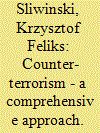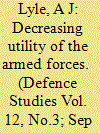| Srl | Item |
| 1 |
ID:
123563


|
|
|
|
|
| Publication |
2013.
|
| Summary/Abstract |
The global war on terror and 9/11 have brought to our attention the perpetual problem of freedom versus security. The more governments strive to provide security, the more they tend to curb the freedoms of their citizens. 'Stop and search' procedures, 28-day detentions of terrorist suspects without charge or new body scanners at the airports are just the 'tip of the iceberg' in a long list of the state's encroachments into our private lives. This paper departs from such a seemingly inescapable predicament. It analyses the role of the public in preventing, protecting and preparing for terrorist attacks under the British government's counter-terrorism strategy known as CONTEST. It explores two social phenomena that are being increasingly promoted by official authorities in the United Kingdom, namely, mobilisation of society and what the author terms 'civilianisation' of security. The latter is defined as a notion relating to non-military, voluntary organisations and the business/private sector, engaged by government but acting in its own right against terrorism threats. 'Civilianisation' of security is also conceived of as a potential tool to bridge the gap between two incompatible worlds of state security and personal freedoms.
|
|
|
|
|
|
|
|
|
|
|
|
|
|
|
|
| 2 |
ID:
114615


|
|
|
|
|
| Publication |
2012.
|
| Summary/Abstract |
Clausewitz described the nature of war in terms of a trinity that could be associated to relationships between the armed forces, the government and society. This paper examines if this trinity is fundamentally affected by three current processes: the increasing use of civilians to supplement or replace military capabilities; the growing employment of unmanned systems; and the rapidly developing capabilities and potential of cyber-based operations. Each of these areas is considered in turn, highlighting how the processes bring about changes between the traditional roles in providing national security of the elements of Clausewitz's trinity. This paper concludes that the changes wrought by the processes of civilianisation, automation and cyber operations do pose significant challenges to the armed forces, but these are evolutionary rather than revolutionary. The wider issue is the increasing reliance of the government on private organisations and other nations to provide the full range of national security measures, and it is in these areas where much work is required to continue to assure security.
|
|
|
|
|
|
|
|
|
|
|
|
|
|
|
|
| 3 |
ID:
106868


|
|
|